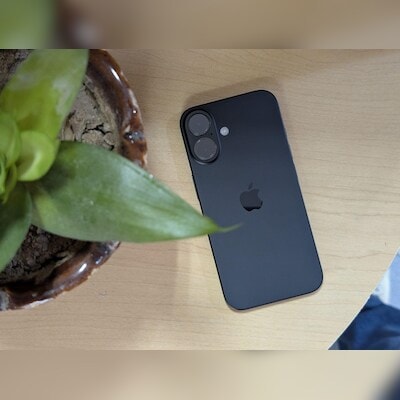Design
Click here to connect with us on WhatsApp
The iPhone 16 continues Apple’s signature design language with a flat aluminium frame and subtle curves at the edges, providing a comfortable in-hand feel. Notably, it introduces some new elements, including new buttons, a revamped camera island, and colour-infused back glass.
The most significant change is the customisable action button, a feature introduced with the iPhone 15 Pro series, now available on the entry-level model. Alongside, it introduced a new “Camera Capture”, which plays a role in the device’s imaging experience.
The new camera island on the iPhone 16 stands out with its vertically stacked dual-camera system, designed to enable spatial video and photo capture for use on virtual reality headsets like Apple’s Vision Pro. While the new design looks streamlined, it creates a noticeable bump, making the phone wobble on flat surfaces.
As with previous models, durability remains a core focus. The iPhone 16 uses Ceramic Shield glass, which Apple claims offers 50 per cent stronger drop protection while maintaining its scratch-resistant qualities. The phone is also IP68-rated, making it resistant to dust and water. The iPhone 16 is available in five colours: ultramarine, teal, pink, white, and black (the reviewed model).
Display and Audio
The iPhone 16 retains the 6.1-inch display size of its predecessor but brings improvements in brightness for better visibility under direct sunlight. It also now dims to as low as 1 nit, which is especially useful for comfortable viewing in dark environments. However, the 60Hz refresh rate remains a significant drawback, leading to less fluid transitions and scrolling, particularly noticeable if you are accustomed to higher refresh rate displays. The absence of an always-on display due to this refresh rate limitation is also a letdown.
The audio experience, on the other hand, is impressive. The iPhone 16 has a stereo speaker system that supports spatial audio. The sound is loud, clear, and well-balanced, with decent depth, making for an enjoyable experience when gaming or watching videos.
Imaging
The iPhone 16’s dual-camera system is versatile, featuring a 48-megapixel main sensor with sensor-shift stabilisation and a 12MP ultra-wide camera with autofocus. By default, the main camera captures 24MP stills and supports 2x optical-quality telephoto using in-sensor zoom in 12MP resolution. The ultra-wide sensor also doubles up as a macro lens for close-up shots, thanks to its autofocus capability.
The primary camera impresses with its colour accuracy and dynamic range, with zero shutter lag being a key highlight in good lighting conditions, allowing for smooth captures of moving objects. The 2x optical-quality zoom works well even in low light, though its quality does not always match a dedicated telephoto lens, especially in artificial lighting conditions.
The ultra-wide sensor offers a 120-degree field of view, making it ideal for capturing landscapes and cityscapes while maintaining colour consistency with the main camera. The macro capabilities of this sensor are also commendable, producing detailed close-up shots.
Apple has also enhanced the camera’s software with a new image pipeline, providing photographic styles that allow users to adjust colours and tones in real-time. Apple emphasises that these styles are not simple filters, as they adjust not only the highlights and shadows but also skin tones and colours across the frame. Furthermore, the new on-screen trackpad offers on-the-fly adjustments for exposure, depth, and zoom while capturing images.
In terms of video, all the camera sensors, including the front-facing one, support 4K resolution at 60fps with Dolby Vision. Switching between sensors while recording is seamless, avoiding the shutter issues seen in competitors like the Google Pixel 9 series. A significant improvement in audio recording is the addition of spatial audio capture, and a new Audio Mix feature that allows for post-production editing of recorded audio. Four options are offered in Audio Mix: Standard, In-Frame, Studio, and Cinematic, with a slider for fine-tuning.
Lastly, the Camera Capture button offers an innovative way to access camera functions with different press types and swipe gestures, though it requires some learning to use advanced features like zoom, exposure, and photographic styles.
Software
The iPhone 16 runs on iOS 18, which introduces new apps and enhancements to existing ones. Notably, iOS 18 supports more India-focused features, including the ability to customise clock widgets in 12 Indian languages. Another major update is the ability to place apps and widgets in any open position on the home screen. Live Voicemail, introduced with iOS 17, is now enabled for calls in India, offering real-time transcription of voicemails.
A Passwords app has also been introduced, which securely stores credentials and syncs them across Apple devices with end-to-end encryption. The iPhone 16 also benefits from Game Mode, prioritising system resources to ensure smooth gameplay, particularly for demanding titles like Resident Evil 4 and Assassin’s Creed Mirage.
Performance
The iPhone 16 is powered by Apple’s A18 system-in-package (SiP), delivering consistent and efficient performance. It handles routine tasks with ease and performs impressively under heavy workloads, such as extended 4K video recording or multimedia editing. Gaming is also smooth, with hardware-accelerated ray tracing being a standout feature in AAA titles.
Battery and Charging
The iPhone 16 delivers all-day battery life under moderate use but drains quickly with intensive workloads. It comes with a braided USB-C cable, supporting both data transfer and charging. Fast charging is possible with a 20W or higher power adaptor, taking about an hour to charge fully. Notably, wireless charging is supported up to 25W with Qi2 compatibility, offering similar charging speeds to wired charging. However, the USB-C port is USB 2.0, which limits data transfer speeds to 480Mb/s.
Verdict
The iPhone 16 brings meaningful upgrades over the iPhone 15, with improved imaging capabilities, software enhancements, and the promise of Apple Intelligence features in the future. However, the absence of a higher refresh rate display and the slower USB-C port might disappoint some users. At Rs 79,900 for the base 128GB model, the iPhone 16 delivers solid value, especially with AI-driven updates expected to enhance the experience further.
